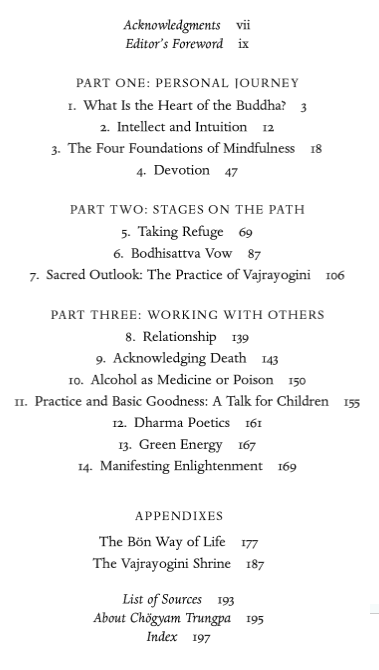How did Chogyam Trungpa Rinpoche justify drinking alcohol? How did his students justify his drinking? Is it possible an enlightened being could or would drink alcohol if they had been physically injured and had serious chronic pain? Like Rinpoche had chronic physical pain? What about strong opiate pain killers?
3 Answers
American culture & American students; similar to how today American "Buddhist" teachers promote "liberalism" (even though liberalism is contrary to the Dhamma).
There are, young householder, these six evil consequences in associating with evil companions, namely: any gambler, any libertine, any drunkard, any swindler, any cheat, any rowdy is his friend and companion.
-
1Are you saying that this is how he justified it? It's not clear: I think your answer isn't a sentence, it seems to be missing a subject and a verb.– ChrisW ♦Commented May 7, 2018 at 20:20
-
Too bad people all can't be as terrific as us, huh? Maybe they are!– LowbrowCommented May 7, 2018 at 23:05
-
If that's liberalism, it looks like it's Tibetan liberalism rather than American liberalism, see Andrei's answer.– kamiCommented May 8, 2018 at 23:08
-
I read the old answer which seemed to claim a person can have abusive sex in the non-dual state. Personally, i can't imagine having sex with ego. Sex is based on perception of self, internally & externally. Commented May 9, 2018 at 1:39
Quoting from "Treasury of Precious Qualities" by Jigme Lingpa, with commentary by Longchen Yeshe Dorje, Kangyur Rinpoche, with a foreword by H.H. the Dalai Lama:
Alcohol, the taking of which is a downfall according to the shravaka Pratimoksha and constitutes a fault in the bodhisattva discipline, is regarded in the Mantrayana as a substance of samaya that must always be present. The Guhyagarbha-tantra states:
Meat and alcohol must not be lacking
For they are substance of accomplishment,
Food and drink, essences and fruits
And all that is a pleasure to the senses.and also:
In particular, it is improper for meat and alcohol to be lacking.
It is taught that such substances are to be enjoyed by yogis who, by means of the practice of the stages of generation and perfection, are able to overcome the power of their thoughts—which at first seem so solid and real but which at length appear as the very deity. In general, this refers to the aspirational deity, for those who are on the path of accumulation; to the deity of wind-mind, for those who are on the path of joining; to the deity of luminosity, for those who are on the path of seeing; to the deity of the united level of learning, for those who are on the path of meditation; and to the deity of the united level of the Dharmakaya and Rupakaya, for those who are on the path of no more learning.
Practitioners of the inner tantras of the Mantrayana act without dualistic clinging, in such a way as to support their view of the purity and equality of phenomena. Through the skillful means of the generation stage, their own aggregates and elements, the universe itself, and all the beings that inhabit it arise as the display of the deity, mantra, and mudra. Such practitioners bless the substances of the sacred feast, or tsok offering, transforming them into amrita. And when they enjoy them, the alcohol is no longer ordinary; neither is their attitude one of ordinary indulgence. Within this state of great purity and equality, their perceptions are transmuted and they experience themselves as the deity and the alcohol as amrita. In such circumstances, yogis and yoginis are allowed to consume alcohol. They do not cling, out of self-interest, to ethical precepts concerning what is to be adopted or abandoned, regarding them as truly existent and immutable values, and they are not attached to their self-image as bhikshus and bhikshunis. Neither do they cling to the notion of altruistic generosity in the relative, materialistic sense, clinging to the idea of being Bodhisattvas. Yogis and yoginis who are thus allowed to partake of alcohol are not like Shravakas, who must repudiate desire because they have no means whereby defilements and sensual pleasures may be harnessed on the spiritual path. Neither are such practitioners like ordinary people, who, in the grip of negativity, accumulate actions that propel them into samsaric existence. Through the profound yogas of generation and perfection, all perceptions are transmuted. All appearances become the infinite mandala of deities. The samaya substances, alcohol and so forth, are enjoyed as amrita, and for that reason they may be consumed. Not only is no fault committed but merit increases, for yogis and yoginis who enjoy such samaya substances are in fact making offerings to the Three Jewels and the Yidam deity. It is thus that their accumulation of merit and their development of spiritual qualities are enhanced far more intensely than if they were to make offerings to the Sangha—the Sangha, that is, composed of monks and nuns confined to the pratimoksha discipline, or of ordained Bodhisattvas who strive for the sake of others but who as yet lack the view of purity and equality.
There's a chapter titled Alcohol as Medicine or Poison: in one of his books which is titled The Heart of the Buddha.
